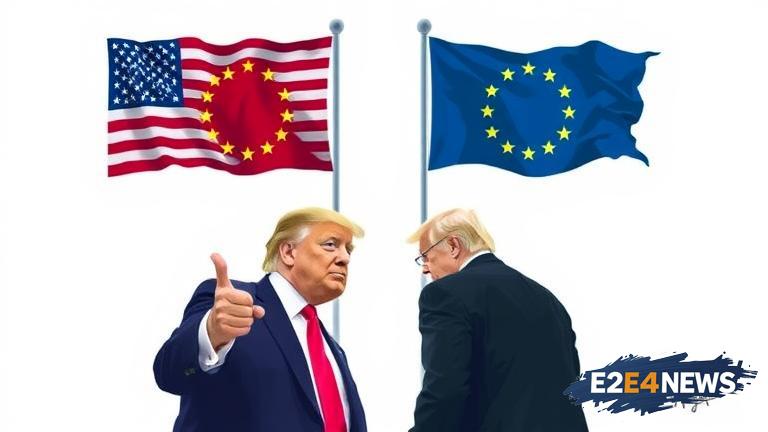The United States and the European Union are facing a significant escalation in trade tensions as President Donald Trump has threatened to impose a 30% tariff on EU imports. This move has sparked widespread concern among economists, politicians, and business leaders, who fear that it could lead to a full-blown trade war between the two economic giants. The tariffs, which would affect a wide range of EU products, including cars, aircraft, and agricultural goods, are seen as a response to the EU’s alleged unfair trade practices. The EU has been accused of imposing tariffs on US goods, including bourbon whiskey and Harley-Davidson motorcycles, which has led to a significant trade deficit between the two regions. Trump has long been a vocal critic of the EU’s trade policies, which he claims are designed to protect European industries at the expense of American businesses. The threat of tariffs has been met with widespread criticism from EU leaders, who argue that it would be a disastrous move that would harm both economies. The EU has warned that it would retaliate with its own tariffs on US goods, which could lead to a devastating trade war. The trade tensions between the US and EU have been simmering for months, with both sides engaging in a war of words over trade policies. The US has already imposed tariffs on EU steel and aluminum imports, which has led to a significant increase in prices for these goods. The EU has responded by imposing its own tariffs on US goods, including orange juice and peanut butter. The trade war has already had a significant impact on businesses on both sides of the Atlantic, with many companies reporting significant losses due to the tariffs. The economic instability caused by the trade war has also led to a decline in investor confidence, which could have far-reaching consequences for the global economy. The US and EU have a long history of cooperation on trade issues, but the current tensions have raised concerns that this relationship may be irreparably damaged. The World Trade Organization (WTO) has warned that a trade war between the US and EU would have significant consequences for the global economy, including higher prices, reduced economic growth, and increased unemployment. The WTO has called on both sides to engage in negotiations to resolve their differences and avoid a trade war. Despite the warnings, Trump has shown no signs of backing down, and the EU has vowed to defend its interests. The trade tensions between the US and EU are likely to continue in the coming months, with significant consequences for businesses, consumers, and the global economy. The situation is being closely monitored by economists and politicians around the world, who are waiting to see how the situation will unfold. The US and EU are two of the world’s largest economies, and a trade war between them would have significant consequences for the global economy. The trade war would also have significant implications for other countries, including China, which is already facing significant trade tensions with the US. The situation is complex and multifaceted, with many different factors at play. The outcome is uncertain, but one thing is clear: the trade tensions between the US and EU have the potential to cause significant economic instability and harm businesses and consumers on both sides of the Atlantic.
